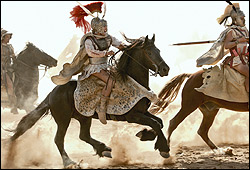Every movie is, in a sense, a commentary on the movie that came before it. Alexander, which opens Wednesday, Nov. 24, at the Metro and other theaters, is no exception. It looks back not only to the sword-and-sandal epics of the prepsychological ’50s, but also to recent hero-on-the-couch studies like Gladiator and Troy. Particularly Troy, since its hero, Achilles, was the most famous of Greek martial leaders before Alexander. His name is constantly invoked in this fourth-century-B.C. picture; he’s the Elvis of the classical world and the Jim Morrison of director Oliver Stone’s personal pantheon. Naturally, young Alexander wants to grow up like Achilles and even eclipse him in glory. So what we want to know of the grown king is, how will Colin Farrell compare against Brad Pitt? Who comes off better in the battle of the golden-haired golden-age immortals?
Farrell’s unquestionably the better actor, but Pitt has the better hair. Tie game. Yet Pitt enjoyed a much more specific and apprehensible task in Troy: defeat the Trojans, kill Hector, and avenge Patroclus. His Achilles is a simple man of action, a creature of fate. Poor Farrell has to follow a sweeping, eastward-looking destiny that “Asia and Europe will come together” under Alexander’s rule. To do so means leading his Macedonian (Greek) troops first against the Persians and their king, Darius, then even deeper into the uncharted Orient against pagans, barbarians, savages, elephants, and even monkeys. (Sounds funny. Isn’t.) By the time he drags his weary army into India (about two hours into a nearly three-hour movie), the monsoons have made his blond mullet look even worse. And we viewers are as exhausted as his soldiers.
Determined to march to the ocean, crazed like Kinski in Aguirre, the Wrath of God, this benevolent conquistador talks about wanting to bond with his new subjects, to bring Hellenic light into their benighted lands. He even marries a sexy but dangerous Bactrian princess (Rosario Dawson) as a sign of cultural solidarity. His men, sensibly, only want to go home, but Alexander has no exit strategy, making Alexander something of a Vietnam flashback for Stone, another quagmire. Alexander’s intentions are the best and the brightest, but—in good Greek fashion—those same qualities are also his tragic undoing. In a foxhole of self-doubt, he wonders, “Have I become so arrogant that I am blind?” No, Alex, you’re just in an Oliver Stone movie, and the same thing happened to Charlie Sheen in Wall Street.
Of course, you wouldn’t be in any hurry to return home either with a mother like Angelina Jolie waiting for you. Olympias is kind of like the Cruella De Vil of the Hellenic world, only she’s obsessed with snakes, not Dalmatians. (Talk about perfect casting.) A Dionysus-worshipping snob who scorns her hoary one-eyed warrior husband, King Philip (Val Kilmer), she grooms “my little Achilles” for great things. The other part of young Alexander’s education—during which time he’s played by a child actor—consists of wrestling, taming wild stallions, and tutoring from Aristotle (Christopher Plummer), no less. Playing hooky one day, Philip shows him some cave paintings where Oedipus, Prometheus, and their overreaching company leer down from their agonies. Take a hint, son.
Such moments feel like Mythology 101, and Stone similarly lays out his themes—reason versus passion, the tragic flaw, imperial greed versus enlightened leadership—as if in a college survey course. He’s the professor unsure of what these newfangled iPod kids in the lecture hall already know. As a teacher’s aid, he even resorts to allegorical props: the scheming serpent of Olympias’ palace intrigues, the soaring eagle of Alexander’s nobler spirit. At times, Alexander seems like a wildlife documentary. Each periodic cutaway to Olympias writing letters to her far-off adult son—pen in one hand, snake in the other—feels like a visit from the Lizard Queen.
The movie also suffers, as Troy did, from an imbalance between the convincingly big, bloody CG-assisted battle sequences and the meanwhile-back-in-the-tent stuff. Just as Troy soft-peddled the actual (carnal) relations between Achilles and Patroclus, Alexander’s bedroom eyes for loyal Hephaistion (Jared Leto, looking like Patti Smith with eyeliner and long tresses) don’t lead to the bedroom. This is surprising, because the rest of his home life is so luridly soap-operatic: Dad bellowing, “You’re no son of mine!” and Mom wailing, “What have I done to make you hate me so?” It’s like you’ve flipped from the History Channel to As Macedonia Turns.
HAVING ISSUED a big, career-spanning DVD box set earlier this year, the decreasingly prolific Stone evidently has history on his mind. One of the two features missing from that collection is Comandante, a long-form interview with Fidel Castro, his friend and fellow nostalgist. They also seem to share a faith in the “great man” school of history. Unlike Castro, however, Stone is more ambivalent about the mighty hero on horseback. He narrates and frames Alexander from the aged perspective of Ptolemy (Anthony Hopkins), who dully drones on about the fusion of man and myth, how his old friend was inspired by legend into action—and became legend himself. This puts Stone in a bind: If a historical figure doesn’t live up to his renown, left no legacy save his name, why make a movie about him?
In the end, Stone has it both ways. Rueful Ptolemy admits that all Alexander’s achievements crumbled following his premature death (this by a poisoning plot considerably less clear than in JFK), but argues for the enduring success of vision over lasting accomplishment. So if the man, Alexander, followed the myth, Achilles, into greatness, the strength of his imagining matters more than its collapsed results. “We reach, we fall,” Alexander sighs to dying Hephaistion. It’s true of the movie, too, but I hope not of Stone’s career. His paean to failed ambition is honorable, if not Homeric.








